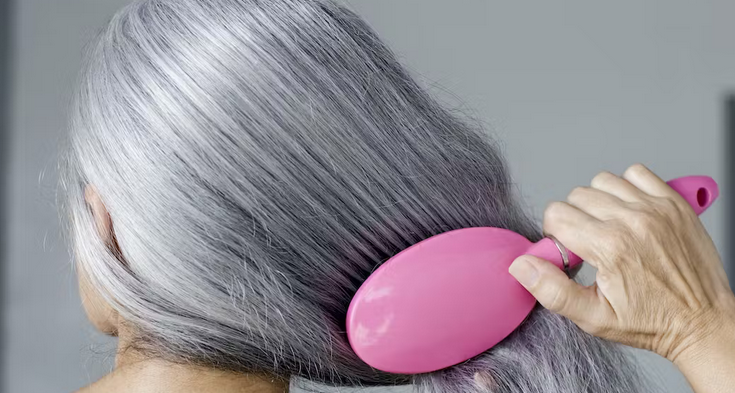|
Getting your Trinity Audio player ready...
|
Aging is a natural part of life, and just like the rest of our body, our hair undergoes changes as we get older. Mature hair often requires different care compared to younger hair. This article will provide valuable tips and insights into maintaining healthy, vibrant, and beautiful mature hair. Whether you’re in your 40s, 50s, or beyond, these strategies will help you age gracefully while embracing your natural beauty.

Understanding the Changes in Mature Hair
As we age, our hair naturally goes through several changes. Understanding these changes is the first step in effective hair maintenance for mature individuals.
Thinning
One of the most common changes is hair thinning. Mature hair tends to become finer and may appear thinner due to a decrease in hair density.
Greying
The loss of pigmentation in hair leads to greying. While this is a natural process, it can affect the overall appearance of your hair.
Reduced Oil Production
Ageing scalps produce less oil, leading to drier hair. This can result in increased frizz and brittleness.
Tips for Healthy Mature Hair
Now that we’ve established the changes that come with ageing, let’s delve into practical tips for maintaining the health and beauty of mature hair.
Choose the Right Hair Products
Opt for sulfate-free shampoos and conditioners to prevent excess dryness.
Use hydrating hair masks or deep conditioners regularly to keep your hair moisturized.
Consider using products specifically designed for mature hair, as they often contain beneficial ingredients.
Gentle Cleansing
Wash your hair with lukewarm water, as hot water can strip away natural oils.
Don’t over-wash your hair. Washing every 2-3 days is usually sufficient.
Be gentle when shampooing to minimize breakage.
Scalp Care
Maintain a healthy scalp by regularly massaging it to stimulate blood circulation.
Consider using a scalp serum with ingredients like biotin or peptides to promote hair growth.
Nutrition and Hydration
A balanced diet rich in vitamins and minerals is essential for healthy hair. Include foods like fatty fish, nuts, and leafy greens.
Stay well-hydrated, as dehydration can lead to dry hair and scalp.
Protect Your Hair
Shield your hair from sun damage by wearing a hat or using products with UV protection.
Minimize heat styling, and when using heat tools, always apply a heat protectant spray.
Regular Trimming
Schedule regular trims to prevent split ends and maintain the shape and volume of your hair.
Embrace Your Natural Color
Instead of frequent hair dyeing, consider embracing your natural colour. Many people find their natural grey hair to be elegant and beautiful.
Stay Stress-Free
Chronic stress can negatively impact your hair. Practice stress-reduction techniques like meditation or yoga.
Supplements for Healthy Hair
Sometimes, despite our best efforts, mature hair may benefit from supplements that promote hair health.
Collagen
Collagen supplements can boost hair elasticity and hydration.
Omega-3 Fatty Acids
Omega-3s, found in fish oil supplements, can enhance hair texture and shine.
Protecting Hair from Environmental Damage
Shield your hair from harsh weather conditions, such as extreme cold or sun exposure, by wearing appropriate headgear.
Use anti-frizz and anti-pollution hair products to minimize the adverse effects of environmental pollutants.
Low-Manipulation Hairstyles
Opt for hairstyles that require less styling and manipulation to reduce stress on your hair.
Consider embracing natural, air-dried styles that are less damaging than frequent heat styling.
Regular Scalp Exfoliation
Exfoliating your scalp can help remove dead skin cells and product buildup, promoting a healthier scalp environment.
Use a gentle scalp scrub or consider DIY exfoliants like brown sugar mixed with conditioner.
Styling Products for Volume
If your hair appears flat or lacks volume, consider using volumizing hair products, such as mousses or root-lifting sprays.
These products can help add body and fullness to mature hair.
Avoiding Tight Hairstyles
Tight hairstyles like ponytails or braids can stress the hair shaft and lead to breakage. Opt for looser styles when possible.
Be cautious with hair accessories like hair ties or clips that can pull on your hair.
Conclusion
Ageing gracefully means embracing the changes that come with time while taking proactive steps to maintain our health and well-being. Your hair is a part of this journey. By understanding the unique needs of mature hair and following these tips, you can enjoy vibrant, healthy hair that reflects your beauty and wisdom. Remember that age is just a number, and with the right care, your hair can continue to shine brightly at any stage of life.
You may find this information useful:
How to establish a hair care routine

